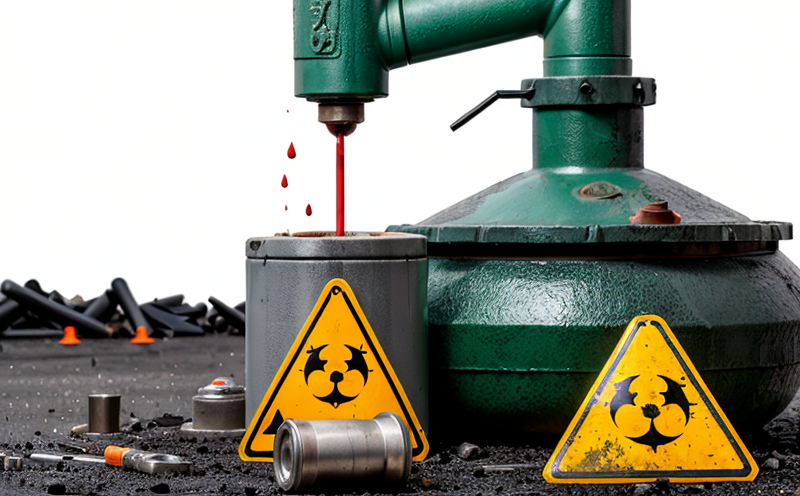Electronic Component Hazardous Screening
In today's fast-evolving electronics industry, ensuring the safety and compliance of electronic components is paramount. The use of hazardous substances in these components can pose significant risks to human health, environmental sustainability, and regulatory compliance. This service provides a comprehensive screening process for identifying and eliminating harmful materials from electronic components.
The service focuses on analyzing various types of electronic components like printed circuit boards (PCBs), integrated circuits (ICs), connectors, and more. The testing procedure involves multiple steps to ensure accuracy and reliability. Components are first subjected to thorough visual inspection followed by physical sampling. Samples are then prepared for analysis using advanced analytical techniques such as Inductively Coupled Plasma Mass Spectrometry (ICP-MS) and Gas Chromatography-Mass Spectrometry (GC-MS).
The acceptance criteria for this service are stringent, adhering to international standards like ISO 16869 and IEC 62321. These standards ensure that the testing process is robust and can identify even trace amounts of hazardous substances. The service not only screens for common hazardous elements such as lead (Pb), mercury (Hg), cadmium (Cd), chromium (Cr), and polybrominated biphenyls (PBDEs), but also for newer emerging substances like phthalates and flame retardants.
The importance of this service cannot be overstated. Quality managers, compliance officers, R&D engineers, and procurement specialists all benefit from its application. It helps in meeting regulatory requirements such as RoHS Directive 2011/65/EU, ensuring products are free from hazardous materials. This not only protects end-users but also enhances corporate social responsibility by promoting sustainable practices.
For R&D engineers, the service offers insights into material composition and potential alternatives, aiding in innovative product development without compromising safety or compliance. Compliance officers can ensure their supply chains meet regulatory standards, reducing legal risks. Procurement teams benefit from better supplier evaluation processes, leading to more responsible sourcing decisions.
The testing process is meticulously designed to cater to these diverse needs while maintaining high accuracy and precision. Each step of the process is documented comprehensively to provide detailed reports that are easily understandable by all stakeholders involved in product development and manufacturing.
Moreover, the service ensures rapid turnaround times, allowing businesses to quickly address any issues identified during testing. This agility supports continuous improvement efforts within companies operating in this competitive sector.
Why Choose This Test
Selecting a reliable electronic component hazardous screening service is crucial for maintaining product safety and regulatory compliance across industries. Our service offers several advantages that make it an ideal choice:
- Comprehensive Coverage: We analyze a wide range of electronic components, ensuring no corner is left unturned in the quest for safe products.
- Strict Compliance: Adherence to international standards guarantees that your products meet all necessary regulatory requirements.
- Rapid Turnaround: Efficient processes allow quick results, enabling faster corrective actions if needed.
- Detailed Reporting: Comprehensive reports provide clear insights into component composition and compliance status.
In summary, choosing our electronic component hazardous screening service ensures that your products are not only safe but also compliant with global standards. This commitment to quality and safety strengthens brand reputation and fosters trust among consumers and partners alike.
International Acceptance and Recognition
The results from our electronic component hazardous screening service hold significant weight internationally, recognized by major regulatory bodies worldwide:
- RoHS Directive 2011/65/EU: Ensures products are free of hazardous substances.
- REACH Regulation (EC) No. 1907/2006: Focuses on the registration, evaluation, authorization, and restriction of chemical substances used in the European Union market.
- WEEE Directive (2012/19/EU): Covers waste electrical and electronic equipment and promotes recycling practices.
- California Proposition 65: Requires businesses to provide warnings to consumers about exposure to chemicals known to cause cancer or reproductive harm.
These recognitions underscore the importance of our service in maintaining global standards for product safety and sustainability.
Environmental and Sustainability Contributions
By offering electronic component hazardous screening, we contribute significantly to environmental protection and sustainable practices:
The elimination of hazardous substances from electronic components reduces their impact on the environment. This includes minimizing landfill waste by ensuring that only safe materials are used in manufacturing processes. Additionally, our service helps companies comply with various environmental regulations, promoting responsible business practices.
Furthermore, the information gathered through this screening process can be utilized to develop more sustainable products and technologies. By understanding which hazardous substances need to be avoided, manufacturers can innovate towards greener alternatives, contributing positively to both the environment and society at large.





